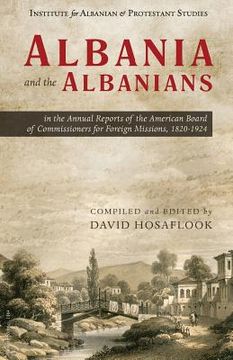Albania and the Albanians in the Annual Reports of the American Board of Commissioners for Foreign Missions, 1820-1924 (en Inglés)
Reseña del libro "Albania and the Albanians in the Annual Reports of the American Board of Commissioners for Foreign Missions, 1820-1924 (en Inglés)"
The American Board of Commissioners for Foreign Missions was America's first great Protestant missionary society and played a significant role in establishing the Albanian Evangelical Protestant Movement in the late 1800s, a movement with both a religious and educational emphasis. Each year the ABCFM held an annual meeting at a prominent city in America to discuss their progress all over the world. After the meeting they printed a detailed annual report with selected information.The Albanians are first mentioned in these reports, in passing, in 1827. Again they are mentioned in 1852 and again in 1859. From 1872-1924 they are mentioned in nearly every successive report. This resource is a compilation of portions from the ABCFM's annual reports concerning its work with Albanians. The American missionaries' efforts unfolded in the context of great political and social changes in the Ottoman Empire and the Balkans; therefore, this work also contains information about other nations insofar as such information assists readers to understand the evolution of missionary work among the Albanians.As missionaries established their presence in a particular location and began working with a particular nationality, they simultaneously set their sights on new locations and learned about peoples still uninformed about the Gospel. They continually made tours to regions beyond their current locations and issued appeals for more funding and more laborers. Their role model was the Apostle Paul, who had heard a "Macedonian call" (cf. New Testament, Acts 16:9-10) and who continually moved on to new areas-such as Illyricum-where the Gospel was not yet being preached (Romans 15:19-20). With such a mindset, it was only a matter of time before the American Board would discover the Albanian people, begin writing about them, and develop strategies to evangelize them.In 1847 missionary statesman Elias Riggs mentioned the Albanians and lamented that Albanian Christians did not have their own liturgical language and were attending church services in ancient Greek. "This very circumstance," he wrote, "has tended to rouse a feeling of nationality, and a desire to cultivate their own language. The nation feels the want of a language for the expression of religious ideas, of which they can comprehend at least something." The Albanian Protestant movement, through its work in producing Albanian Bibles, Albanian language development, Albanian schools, and Albanian preachers, was perceived as an Albanianizing force that helped Albanians withstand attempts to see its territories fragmented and assimilated.Initially the ABCFM's interest in the Albanian people developed indirectly, under the auspices of its mission stations nearest to Albanian-populated territories. In 1873 the ABCFM sent American missionary families to Monastir (Bitola) and made contact with a young Albanian, Gerasim Kyrias. The missionaries mentored Kyrias and educated him in their schools in Monastir and Samokov, Bulgaria. The ABCFM also educated his brother George in Samokov and his sisters Sevasti and Paraskevi in Constantinople. The Kyrias siblings were not only pioneers of the early Albanian Protestant movement but also pioneers of Albanian education, especially female education. In 1890 Gerasim was ordained as Albania's first Protestant preacher. In 1891 Gerasim and Sevasti went to Kortcha and founded one of the first Albanian schools for girls. That same year Gerasim founded the first Albanian Evangelical Church. A year later an Evangelical Brotherhood was formed, "having as its sole object the development of the Albanian language and the extension of the knowledge of the Gospel."This chronological overview is an important starting point for those seeking to understand the evolution of the American Board in the Ottoman Balkans and its contributions to Albania's language and culture.

